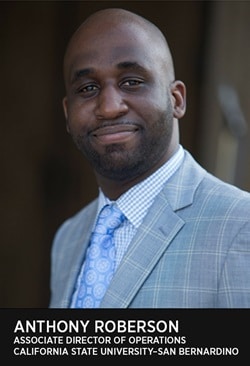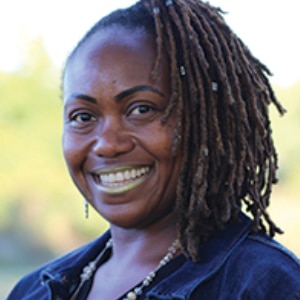Closing the Gap: Where Are They Now … with Anthony Roberson
With the announcement today of ACUI’s third annual cohort of its Closing the Gap career advancement program, it seems a perfect time to begin hearing from the program’s past participants, and how they are doing today. This month we feature Anthony Roberson, associate director of operations at California State University–San Bernardino, who was a member of the inaugural 2020 cohort. Roberson was also the 2017 recipient of ACUI’s Revis A. Cox Memorial Award, and a past member of the Association’s Council for Diversity and Inclusion.
Anthony, tell us how you got your start in student affairs.
I got involved with the Council for D&I for ACUI and that gave me a different opportunity to network and put myself out there. I won the Revis Cox award for the multicultural work I do with here at the university developing affinity centers, the Pan African Success Center, and developing programs within the student union.
What led you to higher ed and what has kept you there?
I was working in the community college sector, and trying to sort out, how can I get into higher ed? My access came through being an evening custodian. After attending my first ACUI conference in 2009 I realized this is not just a job, it’s a career. I met people like Debra Hammond and the directors and got involved. I found my niche, my why. I kept at it, building myself educationally, professionally and excelling in higher education and moving up.
Tell me about the importance of networking and sponsorship as it relates to your career and the Closing the Gap program.

This program was endorsed by the leaders of COMP. The program is a gateway, a path to make sure we are positioned to secure opportunities and be selected as Executive Directors of student unions. This program will prepare us for those roles so we are developed and can attend (Aspiring Directors) institutes that support us in the best way.
Getting involved in COMP (community of multi-ethnic professionals) seeing us in the space, attending meetings and talking to like-minded individuals who look like me, and understanding we have a place in this field, that was huge for me. I was able to network with folks across the nation. Reaching out to find out how they handle hiring, job descriptions, and having an opportunity to do workshops for different teams allowed me to tap into that collective expertise.
How important is it to see people who look like you?
It’s important for me because of the students I interact with daily.
Many institutions are HSIs (Hispanic Serving Institutions), we are often down in numbers and populations related to African Americans, Black students, faculty, staff, and administrators. When you are in board rooms and conference rooms and there are only 1 or 2 (Black people) it’s hard to advocate because the perception may be that we are angry, but the truth is we are underrepresented. We are passionate, yet when we don’t see diverse representation in these rooms it raises questions. What are the hiring practices? Recruiting practices, Retention practices? How are we ensuring our students are graduating and what is the experience like for us?
It’s very important for us to be in those spaces because we bring a different perspective. We are not a monolith; we come from many diasporas. We bring our lived experiences and our creativity; we think outside the box. It’s great to have different people at the table because sometimes those same people at the table stay stuck. But when we come to the table and bring our authenticity, we have the potential to open minds and shift the perspective.
What was it like being part of the inaugural Closing the Gap program?
It was an incredible experience. The pandemic hit just before we launched so we didn’t travel to Indiana as planned. Our program was all virtual and I was able to interact with colleagues from around the country, meeting men and women of color and getting their perspectives and lived experience. How they show up every day, and then how the various aspects of being a Black professional in higher ed unfolded for them.
Our first cohort was a unique group because we were the first. I think we’ll always remember each other. We heard from incredible speakers from across the nation who provided valuable insight. The content was tailored for us; we were able to ask questions and be in a space that was made for us, where we were comfortable and safe and learn in a way that would help us grow professionally.
This was an opportunity for us to stand in the gap for each other.
Even though our cohort wasn’t physically together, we were creating safe spaces virtually to have authentic conversations that helped us move forward and drive change. Our cohort created a non-judgmental, progressive group that allowed us to move forward together and make each other successful.
How did your expectations of the program evolve?
The program got better and better with each session. I am big on professional development, filling my toolbox, learning and gathering information and taking it in. I know we have to put in the work to get better; to be competitive and prepare in the right way and you can be competitive with anyone in the nation in your field. I did a lot of self-reflection, what I needed to work on to learn from the sessions, panels, and discussions. It was a privilege to be selected and I wanted to make sure I was fully engaged, asking questions, learning, and improving. That was important to me as I went through the program.
I commend ACUI for creating this program. I want people to understand that people who look like us deserve to be here, we deserve to be seen as any other colleague at a PWI (Primarily White Institution), HSI, or HBCU (Historically Black College or University). We are different in our own way, that makes us unique and for us to be highlighted is incredible. There are young kids who know nothing about these roles in higher education. But to see you or me, we represent what they can be. I am a living hope. I am a person about whom a young person might say, I can do that too.
The cohort made me who I am today, a better person, I am even more prepared for what lies ahead. If anyone has an opportunity to go through this program, they should. In 2009, I wasn’t the Anthony I am now; with the connections I’ve made and experiences I’ve had, I am more comfortable in my own skin.
What was one key takeaway from the program that you can use now as you progress in your career?
When you think about running your own union, your own house, make sure you are taking care of yourself. I’m a workaholic and a perfectionist, I try not to make mistakes. But in this field, sometimes you have to see mistakes as lessons that make you better as a professional. Having conversations with staffers and getting better at those discussions, developing that next staff member to be a director, being an authentic, servant leader, making sure those around me are growing. If I make sure of that, I will get better.
What is the proudest moment of your career?
The proudest moment of my career is this building in my virtual background. As a Black man I was responsible for building this state-of-the-art student union during a pandemic. No one else can say they built a $90 million-dollar, world class student union during a pandemic, and did it well. In our business, and in our careers, people don’t get the opportunity to build student unions. This project brought up so many emotions; being at the table, calling the shots, working with student leaders, tracking the details, and making sure they (students) were proud of the project.
This project is one thing that kept me going during the pandemic and kept me moving forward because the end goal was to finish this building. I was one of few folks allowed on campus, because we were shut down. There were obstacles and hurdles to overcome, materials stuck on docks and struggles to get deliveries into California, but I persevered and I’m proud of it. The icing on the cake was the grand opening in mid-April where thousands of people walked through including alumni, current students, and other guests.
When I think about universities and recruitment activities, they (recruiters) bring prospective students and their parents to the student union. They tell them, this is the Pan African Student Success Center, where you’ll go bowling, and here is where you’ll see Michele Obama speak. This is the living room of the campus where you’ll make connections and friendships. Who knows, someone may meet their husband or wife here. I cannot imagine the connections and bonds that will be made here, long after I am gone.
What is on the career horizon for you?
My legacy is set. I’m always pushing forward, and I want to stretch my branches out somewhere else, taking on another major effort, a new endeavor and run another student union somewhere else in the nation.

